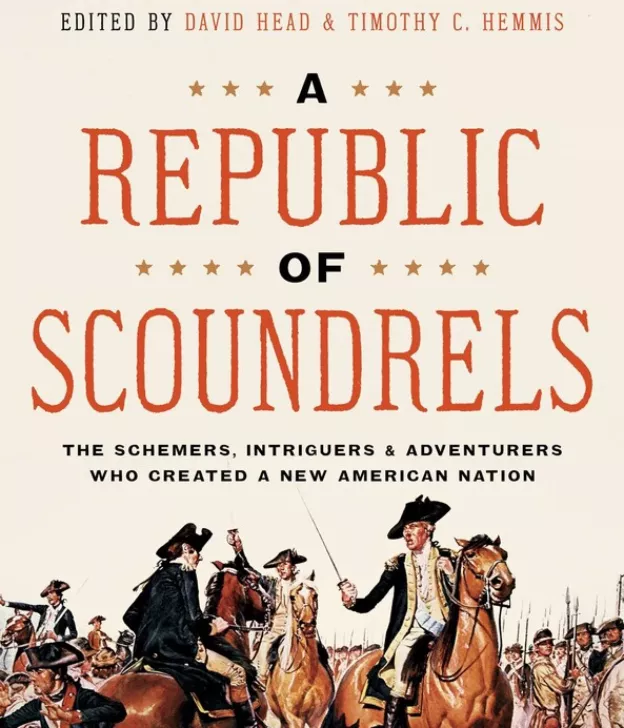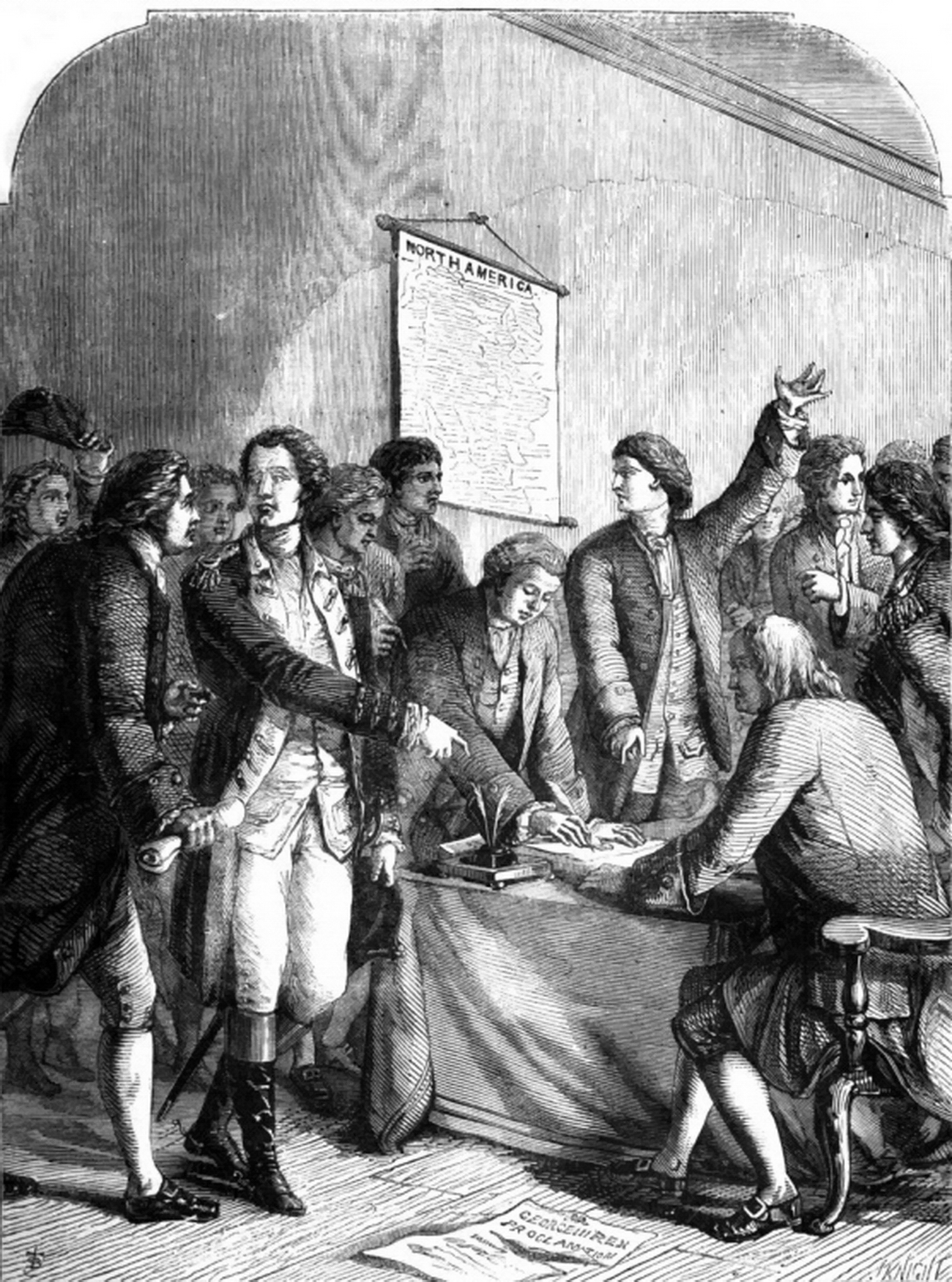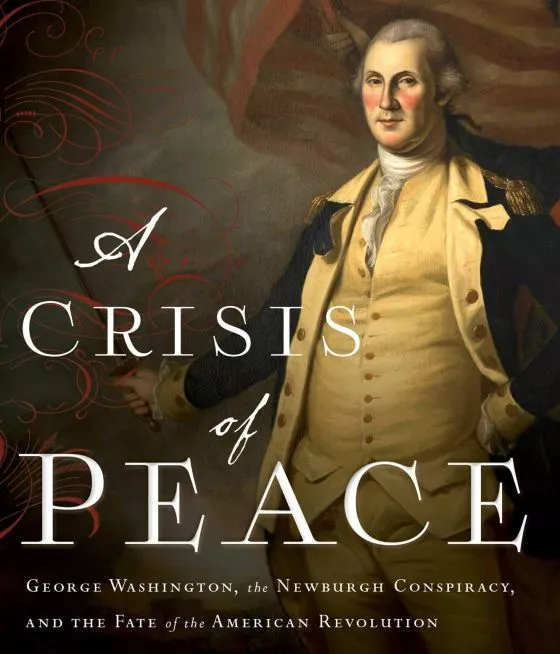
An interview with David Head
JMC Resident Historian Elliott Drago sat down with JMC Scholar David Head to discuss his new book, A Republic of Scoundrels: The Schemers, Intriguers, and Adventurers Who Created a New American Nation, which he co-edited with Timothy Hemmis. Dr. Head is a history professor at the University of Central Florida in Orlando.
These guys are nuts!
ED: What inspired you to become a historian?
DH: I became a historian because of my mom. She suggested it might be a good career for me, but even more, she set an example of how important it is to remember our family’s past. She kept detailed baby books for me and my brothers and sisters and each day she recorded what happened on a calendar. I’m one of six kids, so I have no idea how she had the time. It must have meant a lot to her. I know it means a lot to me and my siblings to have those memories recorded now.
ED: What is your area of specialty, and what sparked your interest in that topic?

DH: My area of specialty has changed over my career. I went to grad school to research and write about pirates, and I eventually settled not on the classic period of pirate activity—the late seventeenth and early eighteenth century—but the early nineteenth century. I also ended up writing more about privateers (privately owned warships commissioned to attack the enemy during times of war) rather than pirates. My dissertation and first book were about Americans in the 1810s who joined the Spanish American Wars of Independence by becoming privateers. (Ed. Note: Dreams do indeed come true: Dr. Head also wrote a fantastic book about pirates entitled, The Golden Age of Piracy: The Rise, Fall, and Enduring Popularity of Pirates)
I’ve since shifted into the American Revolution. The reason was largely practical. As I got married, my wife and I started a family and as I worked in positions that required mostly teaching, it was clear I couldn’t do the kind of research that required extensive travel and long stretches of uninterrupted time to think and write. There are tons of published sources on the American Revolution, however. Just think of the wonderful publications and projects devoted to figures like George Washington, Thomas Jefferson, Benjamin Franklin, and others. Plus, even more documents have been microfilmed and things like Google Books and the Internet Archive bring previously obscure texts, the kind of things you used to have to visit a specialized library for, right to your computer screen.
As a result, I published a book about George Washington’s leadership at the end of the war in an episode known as the Newburgh Conspiracy, and now my colleague Tim Hemmis and I have co-edited A Republic of Scoundrels, about the Revolution and its aftermath and the kind of society that emerged.

ED: In the conclusion to A Republic of Scoundrels you posed the question, “Why were there so many scoundrels in the early republic?” How does your answer to that question change how we interpret political loyalties and what it meant to be “an American” during that era?
DH: My friend and co-editor Tim came up with the idea for a book about scoundrels when he started thinking about that question. In his archival research on the period, he kept noticing all these men during the Revolution and immediately after, who weren’t behaving the way the conventional wisdom of the period said made you a virtuous American citizen. They saw the Revolution as their big chance to grab something for themselves.
Money, land, power: they were ambitious for all these things. And it wasn’t just that people always fall short of ideals. You’ll always find selfishness, self-centeredness, and all that. No, it looked like the Revolution itself had unintentionally made self-seeking behavior more prominent. For example, as an independent nation, the United States could set its own foreign policy, without taking orders from Britain. Self-determination and avoiding European power politics. Sounds great. But many men effectively made their own policy, especially along the border with the Spanish territory along the Mississippi River.
They schemed to create new states, even possibly new nations. They pursued business opportunities in the borderlands without regard to how it would affect U.S. policy. One man, General James Wilkinson, was a spy, selling information to Spanish officials worried about Americans encroaching on their territory. Wilkinson was important in the development of Kentucky, so he was one of those encroaching Ame
The prevalence of scoundrels reminds us about the importance of looking at individuals and their circumstances when interpreting early America.
DH: It’s easy to condense people and events to easy-to-remember types. Hamilton believed this, and Jefferson believed that. Federalists were like this, Republicans were like that. It gives the impression that our ancestors possessed a clarity of vision and a sense of purpose that we lack. But it only seems that way because we know life today is a mess while we only remember the past cleanly, with the chaos smoothed away. Every America was chaotic too.
ED: What has your scholarship taught you about America’s founding principles and history?
DH: How messy the founding was and, honestly, how messy every era is. We tend to remember the Founders as statesmen. We even capitalize Founders! As if they were already memorialized in stone when they were declaring independence, winning the Revolution, framing a new Constitution, and governing with it. It’s important to draw inspiration from their achievement, and that means condensing their activities to make them meaningful to people today. That’s a necessary trade-off. But it is a trade-off between comprehensibility and accuracy.
Inspirational spotlight
DH: In his James Madison book Richard Brookhiser remarks that we prefer to remember Madison the Constitution maker rather than Madison the politician. “Politics embarrasses us,” Brookhiser writes, so we like to pretend our forefathers were above it. That line has stuck with me. It certainly captures my attitude—politics is often embarrassing!—but it also explains a lot about what we miss when we assume the Founders were somehow above the rough-and-tumble world of political dealmaking.
When I was researching my Newburgh Conspiracy book, I got to reading the correspondence between John Adams and Thomas Jefferson from when they reconciled as old men and renewed their friendship. One of the things that brought them together was their mutual hatred of Alexander Hamilton. They bonded over stories about how awful he was. It’s one of the things that reminded them how much they enjoyed each other’s company. That tells you a lot about who these men really were, with all kinds of faults and failings, even as they created something of lasting importance.

ED: What’s one thing you wish everyone knew about American history?
DH: I wish everyone knew how dramatic history can be. We know how events turned out, so there’s a tendency to miss that nothing was for certain and events could easily have gone any number of different ways. I also wish people appreciate how fun history can be if you approach it with the right sense of humor. There’s a story I love about James Monroe (I think) wanting to challenge John Adams, when he was president, to a duel. I forget why. Anyway, he complains about why he can’t. Reason 1: Adams is an old man. Reason 2: he is the president of the United States. These guys are nuts!
Elliott Drago serves as the JMC’s Manager of the History Initiative. He is a historian of American history and the author of Street Diplomacy: The Politics of Slavery and Freedom in Philadelphia, 1820-1850 (Johns-Hopkins University Press, 2022).
